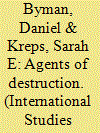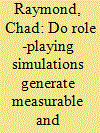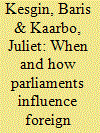|
|
|
Sort Order |
|
|
|
Items / Page
|
|
|
|
|
|
|
| Srl | Item |
| 1 |
ID:
095638


|
|
|
|
|
| Publication |
2010.
|
| Summary/Abstract |
This article evaluates state-sponsored terrorism as a principal-agent issue. More often applied to the study of licit national or international institutions as a way to improve their governance, we argue that applying principal-agent analysis to illicit relationships such as those between states and terrorist agents is an equally fruitful application, though one with different objectives. Rather than being used as a tool to improve governance, applying principal-agent analysis to illicit relationships such as state-sponsored terrorism may point to areas of susceptibility and thus inform more effective counterterrorism strategies. In this article, we explain why states delegate to terrorist groups, how they seek to control their agents, and the tensions in the relationship, both generally and through specific reference to Iran's sponsorship of Hizballah, Syria of various Palestinian groups, and the Taliban of al-Qa'ida. This analysis yields propositions about the conditions under which states are likely to delegate to terrorist groups and specific recommendations on how principal-agent problems of these illicit relationships may be used in practice to combat terrorism.
|
|
|
|
|
|
|
|
|
|
|
|
|
|
|
|
| 2 |
ID:
095641


|
|
|
|
|
| Publication |
2010.
|
| Summary/Abstract |
Role-playing simulations are frequently claimed to be effective pedagogical tools in the teaching of international relations (IR); however, there is a surprising lack of empirical evidence on their classroom utility. The assessment of simulations remains mostly anecdotal, and some recent research has found little to no statistically significant improvements in quantitative measures of academic performance among students who participated in them [for example, International Studies Perspectives (2006), vol. 7, pp. 395; International Studies Perspectives (2008), vol. 9, pp. 75-89]. Scant research has been conducted on how role-playing simulations might affect students' perceptions of the instructor's teaching. This paper investigates whether a simulation had statistically significant effect on students' exam scores in an IR course or on student teaching evaluation scores.
|
|
|
|
|
|
|
|
|
|
|
|
|
|
|
|
| 3 |
ID:
095643


|
|
|
|
|
| Publication |
2010.
|
| Summary/Abstract |
A number of organizations have a mission of encouraging peace throughout the world by enhancing young people's knowledge and understanding of other countries and cultures. One strategy used to further this mission is international or intercultural exchange programs. Most evaluations of exchange programs gather data only from the direct participants who traveled to another country. But these programs have the potential to have impacts that expand beyond the direct participants-or "ripple effects." Thus, a more appropriate methodology to evaluate exchange programs is "360-degree feedback," which gathers data from multiple sources. This study uses 360-degree feedback to evaluate a youth peacebuilding and exchange program by gathering data not only from the exchange students but also from chaperones, host families, and students and teachers in the host school. ANOVA analyses finds that the program had positive impacts on the exchange students and, in many cases, even greater ripple effects on indirect participants.
|
|
|
|
|
|
|
|
|
|
|
|
|
|
|
|
| 4 |
ID:
095642


|
|
|
|
|
| Publication |
2010.
|
| Summary/Abstract |
Instead of always teaching students how to succeed-as is the norm in higher education-it might also be useful to teach them about failure. Understanding failure (that is, why actors fail to reach common objectives in inter-group settings) gives students deeper insight into how to resolve global problems, and the conditions under which success can be achieved. This enhances student awareness of complexity in world affairs, including the nature of inter-group relations. Simulations are a good way to teach students about the possibility of failure, and how to learn from it, because they allow students to go through the learning process on their own. In this article I discuss how a simulation I ran on Middle Eastern politics can be used as an example of how to instruct students about failure as much as about success.
|
|
|
|
|
|
|
|
|
|
|
|
|
|
|
|
| 5 |
ID:
095640


|
|
|
|
|
| Publication |
2010.
|
| Summary/Abstract |
Studying European Politics can be a challenge! And this is not surprising: even the best scholarly minds of European politics often struggle to give precise definition to such a young, but already so complex and constantly evolving polity as the European Union, and are increasingly at odds with identifying its prospects for survival. One way to achieve a better understanding of the subject is to utilize a threshold concept approach, which is essentially a "less is more" approach that chooses to work with a few "founding" concepts, and identifies a "road map" for independent learning of broader but essentially inter-connected issues of the discipline. The threshold concept approach becomes even more effective if combined with enactive learning-that is, learning-by-doing, through role taking and simulation of the threshold concepts during seminars. Such learning evidently exceeds the boundaries of conventional knowledge and becomes a useful transferable investment for the future.
|
|
|
|
|
|
|
|
|
|
|
|
|
|
|
|
| 6 |
ID:
095639


|
|
|
|
|
| Publication |
2010.
|
| Summary/Abstract |
Turkey's decision on its role in the Iraq war in 2003 illustrates the power-and limits-of parliaments as actors in foreign policy. Traditionally, assemblies are not seen as important players in the foreign policies of parliamentary democracies. Instead, cabinets are generally considered the chief policymaking authorities. If the government enjoys a parliamentary majority, legislatures typically support the cabinet, if they are brought into the process at all. The March 1, 2003 vote by the Turkish parliament to not allow the United States to use Turkey as a base for the Iraq invasion challenges this conventional wisdom on parliamentary influence (in addition to many interest-based explanations of foreign policy). This paper examines this decision in the context of the role of parliaments in foreign policies and explores the relationships between parliamentary influence, leadership, intraparty politics, and public opinion
|
|
|
|
|
|
|
|
|
|
|
|
|
|
|
|
|
|
|
|
|